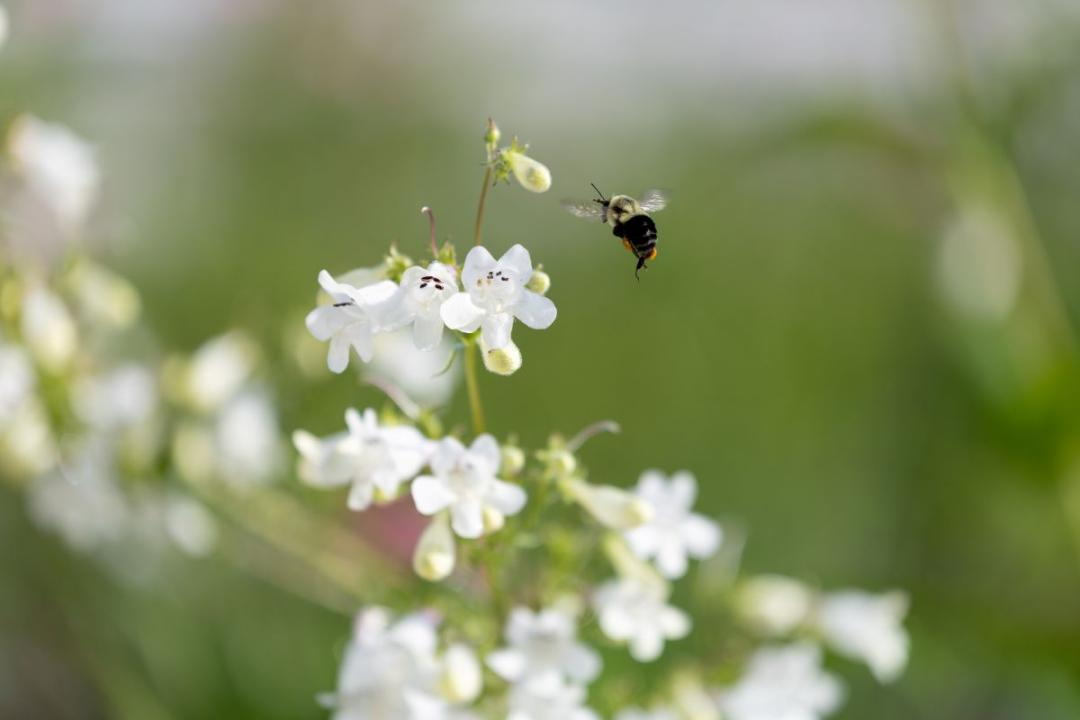Displaying items by tag: pollinators declining
Sweet nectar of spring flows at annual UT pollinator festival
 Pollinators play a vital role in maintaining our ecosystems, economies and agriculture. Here’s a bee in flight at the UT Gardens in Knoxville. R. Lazarian/UTIA
Pollinators play a vital role in maintaining our ecosystems, economies and agriculture. Here’s a bee in flight at the UT Gardens in Knoxville. R. Lazarian/UTIA
Get your buzz on in Knoxville or two other locations in the state during Pollinator Week June 16-25
Lauren Tolley is a University of Tennessee Institute of Agriculture marketing and communications associate.
KNOXVILLE — The University of Tennessee Bee Campus Committee, a group comprised of UT faculty, staff and students, in partnership with the Tennessee Valley Authority and UT Gardens, invites communities across the state to celebrate national Pollinator Week at a series of “Garden Buzz” pollinator events on June 17.
Pollinator Week is an annual celebration in support of pollinator health, initiated and managed by the Pollinator Partnership. This year’s theme is “Pollinators Weave Connections” — highlighting the essential roles pollinators play in creating and expression of human culture, the food we enjoy and the beauty that surrounds us. Pollinator Week is June 16-25.
Similar to UT and TVA’s collaborative Garden Buzz celebrations in previous years, the 2025 Garden Buzz celebrations will offer participants opportunities to learn more about pollinators in Tennessee through educational activities. Attendees can also learn how to start their own pollinator gardens with locally grown plants that help support a thriving ecosystem.
City-based projects are pollinating the planet
 A parklet in Washington DC with brightly colored planters filled with local pollinator plants. Molly McCluskey
A parklet in Washington DC with brightly colored planters filled with local pollinator plants. Molly McCluskey
From pocket parks to large-scale projects, cities around the world are working to reverse a troubling trend.
This story was originally published by The Revelator.
Every June, cities around the globe celebrate Pollinator Week (this year, June 16-22) an international event to raise awareness about the important roles that birds, bats, bees, butterflies, beetles and other small animals serve in pollinating our food systems and landscapes. These crucial species are declining worldwide, with many on the brink of extinction.
Cities have responded to this crisis with a variety of urban initiatives designed to foster pollinator habitats and in the process transform once-stark cement landscapes — as well as pocket parks, curb strips and highway dividers — into lush, welcoming areas for pollinators and humans alike.
In Washington, D.C., ambitious pollinator projects are abundant on rooftops of public, office and private spaces, ranging from the renovated D.C. Public Library’s main branch to National Public Radio’s headquarters, which hosts an apiary. Throughout the District of Columbia, municipal code requires buildings to maintain the tree boxes and curb strips outside their properties. This often leads to creative landscaping on the smallest of scales.